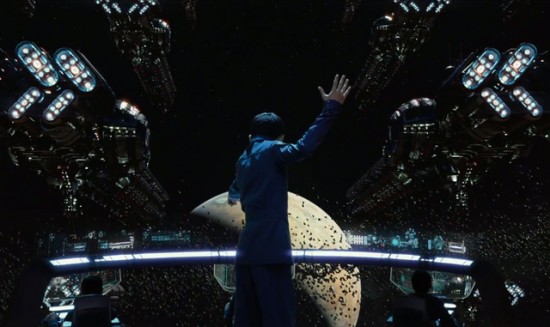Before seeing the film, I had a study group session, and one of my buddies in our group mentioned that he had read several of the book’s in Orson Scott Card’s Ender’s Game series. He said the theme was empathy, and, outside of that and the hubbub surrounding Card’s controversial comments on same-sex marriage, was about the only thing I knew going into the film.
And now, having seen it, I can see bits of that theme peeking through, but ultimately director Gavin Hood (X-Men Origins: Wolverine) appears to have traded depth for spectacle.
In the semi-distant future, following an attack by an alien species known as the Formics, the countries of Earth have placed their best and brightest in the International Fleet academy, a military training ground that’s preparing for the next potential invasion. A. E. Wiggin (Asa Butterfield) a precocious youngster with a talent for strategy, is put through a series of tests administered by Colonel Graff (Harrison Ford), a tough commander who nonetheless sees Ender as the one to ultimately lead the fleet to victory. Overcoming loneliness and antagonism from his peers, Ender continually proves himself through a gauntlet of war games, all throughout questioning the true intentions of his leaders.
Entertainment wise, Ender’s Game delivers. The various war games provide a fun parade of sequences for Hood to show how Ender outsmarts nigh-impossible odds (though, for all his apparent brilliance, Ender’s solutions do seem to rack up the casualties), particularly with one scene involving a weightless battle sphere. The cadets compete against each other to make it through the other team’s gate without getting shot by the opposing players’ tag-guns.
It’s the movie’s response to Harry Potter’s quidditch — though it’s much easier to understand and fits in with the overall story more smoothly. Even more interesting are the moments that suggest Ender’s inability to think of anything, including human relationships, outside of a strategic context, such as when the nasty leader of one team, Bonzo (Moises Arias) attempts to exile Ender from his group. Ender takes the boy aside, offers an alternative suggestion, and then tells him that he can say he won the argument and announce that he’s changed his mind the following day.
However, these moments never pay off. Early on Ford announces to his assistant that he intends to make Ender feel as if he has no friends, and yet, 15 or so minutes later, Ender is given command of a unit made up of all his buddies. I can understand the point of shuffling him around units so he can’t build any long-lasting relationships, and I can understand why the academy would block all the e-mails, but why all the build-up if there’s no conclusion?
Moreso, early on Ender’s in a fight with a bully and continues pummeling him long after submission. Graff asks we he kept kicking the boy, and Ender responds that doing so prevented any future battles. A lot is made of this idea, but when it comes full circle, and is taken to an extreme situation, the payoff and consequences are pushed aside so that the film can set the stage for its sequel.
So why build anything up at all if you’re not going to resolve it? Maybe Hood will develop the ideas he introduces here in subsequent films, but, at least in the context of this first one, it feels like a cheat: Ender’s been conditioned his entire life to resolve confrontation with violence, does he resist that impulse? How does he suffer when he doesn’t? Does he think of his friendships as strategic alliances? If so, what does he get from his potential romance with Petra (Hailee Steinfeld)?
These are the most interesting questions raised, but the movie isn’t very interested in anything beyond simply raising them. It deserves credit for at least doing that — but in the rush to cover every trope of the young-adult genre (or just the Harry Potter and Hunger Games novels/movies), it’s doing a large disservice in ignoring the very things that would set it apart.
In all, it’s a fun watch, but, as weird as it sounds, Ender’s Game deserves more than it allows itself.

